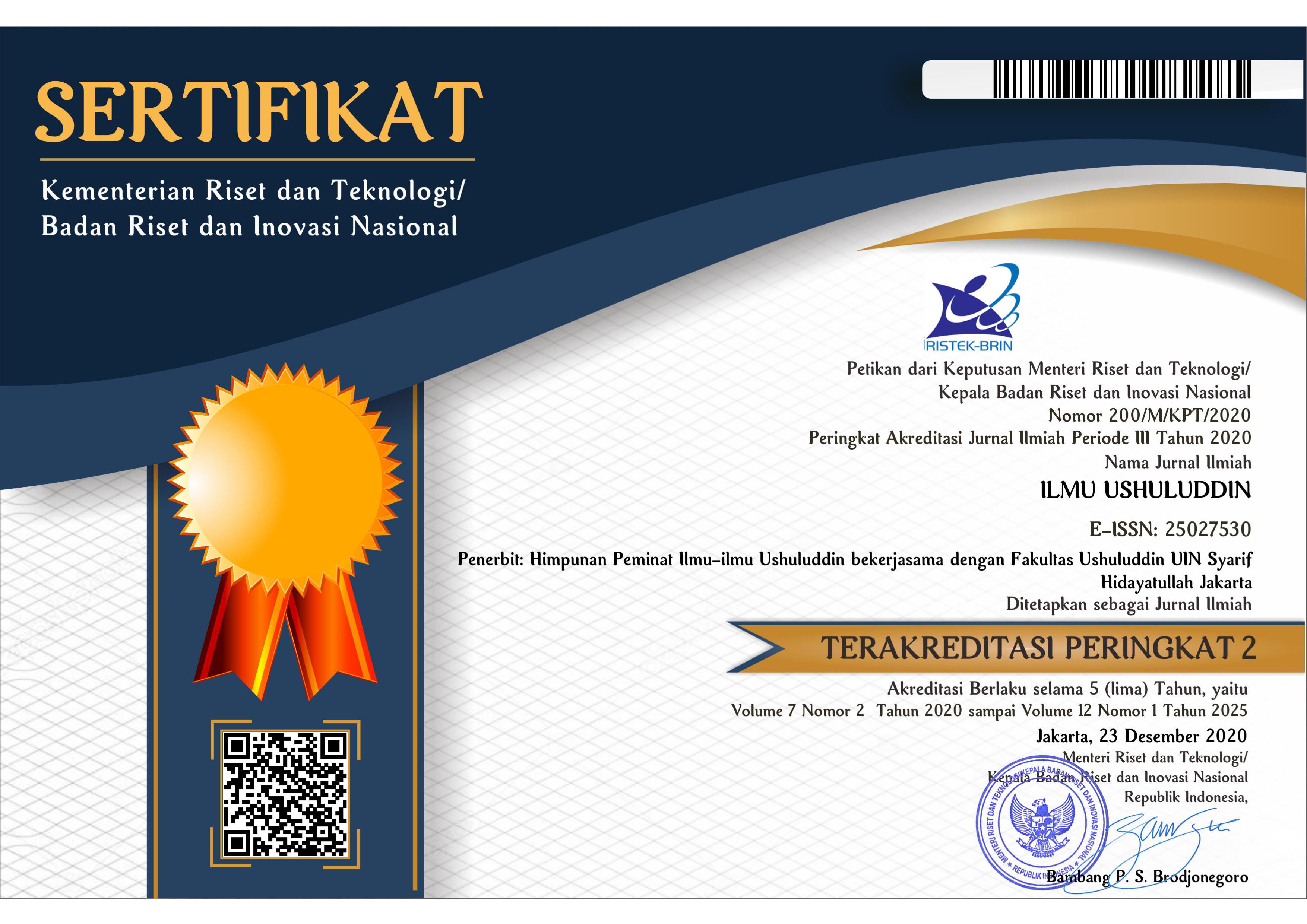SUFISM AND ECONOMIC RESILIENCE: TRAJECTORY OF TAREKAT NAQSYABANDIYAH-KHALIDIYAH BABUSSALAM (TNKB)
DOI:
https://doi.org/10.15408/iu.v9i2.31022Keywords:
Tarekat, Economy, Entrepreneurship, TNKB, Uang SalamAbstract
This article provides updated information on the tarekat following the entrepreneurial bankruptcy in the Tarekat Naqsybandiyah-Khalidiyah Babussalam (TNKB). This study charts the TNKB trend regarding the spiritual institution’s economic toughness. This research asks how TNKB will be able to continue operating if its founder no again walks away from entrepreneurs and what other economies may emerge in his place. Findings from the study show that the entrepreneurial bankruptcy of TNKB entrepreneurs is strongly tied to the conflict of the leader, which is exacerbated by Tuan Guru’s need to concentrate on other issues. Uang salam originated as a substitute for a new economic source to preserve the TNKB. Uang salam is a practice that persists until it eventually makes room for commodification. Commodification is a tactic used by TNKB as part of its survival plan after the entrepreneurial bankruptcy so that it can continue to exist and advance up to the present.
References
Bruinessen, Martin van, “After the Days of Abu Qubays: Indonesian Transformations of the Naqshbandiyya Khalidiyah”, Journal of the History of Sufism, 21 (5), 2007.
Bruinessen, Martin van, “Sufi Orders” in Southeast Asia: From Private Devotions to Social Network and Corporate Action”, R. Michael Feener et Anne M. Blackburn, eds., Buddhist and Islamic Orders in Southern Asia: Comparative Perspectives, Honolulu: University of Hawai’i Press, 2019.
Bruinessen, Martin van, Tarekat Naqsyabandiyah di Indonesia: Survei Historis, Geografis dan Sosiologis, Bandung: Mizan, 1992.
Chih, Rachida, “Sainteté, Maîtrise Spirituelle et Patronage: Les Fondements de l’autorité dans le Soufisme”, Archives de Sciences Sociales des Religions, (125), 2004.
Hamid, Rosnaaini, Adab Sebelum Suluk Tarekat Naqsyabandiyah: Mengikut Syeikh Abdul Wahab Rokan, Kedah: UUM Press, 2016.
Hasjim, Tengkoe, Riwajat Toean Sjeh Abdoel Wahab Toean Goeroe Besilam dan Keradjaan Langkat, Medan: H. Mij. Indische Drukkerij, n.d.
Hidayat, Lisga Lindung, “Tarekat Naqsyabandiyah Syaikh Abdul Wahab Rokan: Sejarah, Ajaran, Amalan dan Dinamika Perubahan”, Miqot, 35 (1), 2011.
Hidayat, Ziaulhaq and Muzakkir Syahrul, “Indonesian Sufi in Malay World: A Prelimenary Exploration with Reference to Tariqa Naqshabandiyya-Khalidiyya Babussalam (TNKB),» Journal of Indonesian Islam, 11 (1), 2017.
Hidayat, Ziaulhaq, “Bisnis Berkah di Makam Tuan Guru: Komodifikasi Ritual pada Haul Tarekat Naqsyabandiyah-Khalidiyah Babussalam (TNKB)”, Jurnal Sinergis Kopertais Wilayah XII, 2 (1), 2014.
Hidayat, Ziaulhaq, Kuasa Kelas Bawah dan Bisnis Berkah di Makam Wali: Narasi Kehidupan Khadim, Ciputat: Pustakapedia, 2019.
Hidayati, Mega and Tito Handoko, “Revivalism of the Tarekat Naqsyabandiyah in Changing the Local Political Landscape of Rokan Hulu, Indonesia in Post-New Order”, Fikrah, 9 (2), 2021.
Irham, M Iqbal, “Pemikiran Sufistik Syekh Abdul Wahab Rokan”, Jurnal Lektur Keagamaan, 8 (2), 2010.
Kraus, Werner, “Some Notes on the Introduction of the Naqshbandiyya-Khalidiyya into Indonesia”, Marc Gaborieu, et al., eds., Naqshbandis: Cheminements et Situation Actuelle d’un Ordre Mystique Musulman, Istanbul and Paris: Editions ISIS, 1999.
Laffan, Michael, The Making of Indonesian Islam: Orientalism and Narration of a Sufi Past, Princeton dan Oxford: Princeton University Press, 2011.
Lombard, Denys, “Les Tarekat en Insulinde”, Alexandre Popovic and Gilles Veinstein, eds, Les Orders Mystiques dans l’Islam: Cheminements et Situation Actuelle, Paris: L’ecole des Hautes Etudes en Sciences Sociales, 1986.
Lombard, Denys, “Tarekat et Entreprise à Sumatra: L’exemple de Syekh Abdul Wahab Rokan (c.1830-1926)”, Marc Gaborieau, et.al., eds., Naqshbandis: Cheminements et Situation Actuelle d’un Ordre Mystique Musulman, Paris: Institut Français d’études Anatoliennes d’Istanbul, 1990.
Mohammad, Abdul Manan, “Tarekat Naqsyabandiyah Khalidiyah in Malaysia: A Study on the Leadership of Haji Ishaq bin Muhammad Arif”, Miqot, 36 (2) 2012.
Mudawar, Tajuddin, Sejarah Almarhum Waliyullah Qutubuzzaman Syeikh Abdul Wahab Rokan Tuan Guru Babussalam, n.p., n.d.
Njoto-Feillard, Gwenaël, L’islam et la Réinvention du Capitalisme en Indonésie, Paris : Karthala, 2012.
Omar, Syed Hadzrullathfi bin Syed and Mohd Shahril bin Othman, “The Ritual Practices of The Naqshbandiyya-Khalidiyya Order in Contemporary Malaysia”, Humanities and Social Sciences Review, 1 (3), 2012.
Perret, Daniel, “De la Forêt Primaire Aux Plantations Coloniales: Les Deux Ruptures Politiques et Socio-économiques de la Côte est de Sumatra-Nord”, Bulletin de l’École française d’Extrême-Orient, 81, 1994.
Perret, Daniel, La Formation d’un Paysage Ethnique Batak et Malais de Sumatra Nord-Est, Paris: Ecole francaise d’Extrême-Orient, 1995.
Reid, Anthony, “The Japanese Occupation and Rival Indonesian Elites: Northern Sumatra in 1942”, The Journal of Asian Studies, 35 (1), 1975.
Rokan, ‘Abd al-Wahāb, “Catatan Syaikh ‘Abd al-Wahhāb Rokan”, Manuscript.
Rokan, ‘Abd al-Wahhab, Wasiat 44, n.p. n.d.
Said, Fuad, Syeikh Abdul Wahab Rokan: Tuan Guru Babussalam, Medan: Pustaka Babussalam, 1983.
Siregar, Lisga Hidayat, “Tarekat Naqsyabandiyah Syekh ‘Abdul Wahab Rokan Babusalam: Suatu Kajian tentang Ajaran dan Aktualisasinya dalam Kehidupan Sosial 1882-1926, PhD Theses, SPs UIN Syarif Hidayatullah Jakarta, 2003.
Umam, Saiful, “The Guardian of the Integral Vision of Islamic Practice: The Naqshabandi Sufi Order in Indonesia”, Studia Islamika, 13 (2), 2006.
Weismann, Itzchak, The Naqshbandiyya: Orthodoxy and Activism in a Worldwide Sufi Tradition, New York: Routledge, 2007.


